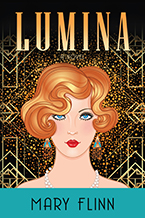April 2, 2019
Lumina: A Novel
Mary Flinn
FictionWorx (2019)
ISBN: 978-1-7335809-0-8
Ebook: 978-1-7335809-1-5
New Novel Recalls Romance at Roaring Twenties Dance Pavilion
 In her latest novel, Lumina, North Carolina author Mary Flinn takes readers on a journey back in time. Lumina was a beautiful beach pavilion where dances were held every Saturday night for the first half of the twentieth century in Wilmington, North Carolina. Now Flinn returns us to the days of the Roaring Twenties when young ladies wore beaded skirts and young men covertly sipped whiskey when the dance matron wasn’t looking. It was an era of cultural change, marked by the first real sexual revolution, Prohibition, the introduction of jazz, and a time when music formed a bond for many whites and African-Americans.
In her latest novel, Lumina, North Carolina author Mary Flinn takes readers on a journey back in time. Lumina was a beautiful beach pavilion where dances were held every Saturday night for the first half of the twentieth century in Wilmington, North Carolina. Now Flinn returns us to the days of the Roaring Twenties when young ladies wore beaded skirts and young men covertly sipped whiskey when the dance matron wasn’t looking. It was an era of cultural change, marked by the first real sexual revolution, Prohibition, the introduction of jazz, and a time when music formed a bond for many whites and African-Americans.
Readers of Mary Flinn’s former novels will enjoy this chance to be enmeshed once again in her world. Although Lumina is her first historical romance, old favorite characters make their appearance in the form of Elle McLarin and some of her friends—Nate, Anne Borden Montgomery (AB), and Mr. May—from A Girl Like That. The story begins when Anne Borden finds a novel based on her mother’s diary and her uncle’s letters from the summer of 1928. The four friends begin a routine of sitting on Anne Borden’s porch and reading the novel out loud. As they do so, readers get alternate glimpses of the changes in the modern-day characters’ world while also hearing the endearing, but at times shocking, tale of Anne Borden’s uncle Kip and her mother Sylvie and the summer that changed their lives.
At the center of it all is Lumina, the magnificent dance pavilion built on Wilmington’s Wrightsville Beach. Known as the “Palace of Light,” it was the place to be on a Saturday night. As Kip describes it in the novel, “Lumina is the great equalizer for young people who are out for a bit of fun and to celebrate the happiness of youth. The best of the bands come there to play for the summer and thousands of people from all walks of life—tourists and locals, middle-class and aristocrats alike, arrive to dance the evening away on a Saturday night. Many a romance has been born at Lumina, I’ll tell you.” It is also a place for excitement and escapism. Kip says at one point in the novel, referring to the hours between eight and midnight, “We were perfect for four more hours.” It was a time when life seemed perfect.
It was also a time when you could meet anyone at the dances. Kip and Sylvie come from a middle class family. Their father owns a clothing store, but at Lumina they have a chance to rub elbows with the Carmichaels—brother and sister Clifton and Catherine—among the wealthiest people in North Carolina, friends of the Vanderbilts, and both attractive and charming, at least on the surface. Kip is instantly smitten with Catherine and begins a whirlwind romance with her. Clifton latches on to Sylvie, who can’t believe such a handsome gentleman is interested in her.
But both Clifton and Catherine have their demons, and as the novel progresses, secrets are revealed that threaten the young couples’ relationships.
Lumina is the perfect book to escape into, and yet it is serious fiction, as serious as anything Fitzgerald wrote. There’s a villain to rival Emily Bronte’s Heathcliff, and a sense of social injustice as strong as that of To Kill a Mockingbird. There are pleasant evenings spent on a porch that recall a past when neighbors actually took the time to speak to each other. There are fast cars and short skirts and a sense that the world is changing, no matter how much the characters wish they could freeze time.
Every page is vibrant with life, longing, and romance, and Flinn knows how to pace the story so readers can come up for air when things get too intense, while constantly keeping us in suspense.
My favorite section was near the end when The Shag—the great dance of the age—is introduced following the Feast of Pirates. It’s a perfect build-up to the climax that effortlessly blends history and fiction. If you’re not familiar with the Shag, it may not sound like a big deal, but when you read the novel, you’ll get goosebumps during these scenes. Flinn knows how to pace her story so that readers find themselves helplessly caught up in the excitement as if riding a rollercoaster. Time can’t be frozen, but these scenes in the novel become so intense they are permanently etched in the reader’s memory as golden moments to remember. Few novelists have this skill, and while Flinn makes it all look effortless, it is the result of years of mastering her craft.
Hollywood is dying to tell stories like this one. The sparkling lights of Lumina, the music wafting out onto the beach, the dazzling dresses, the smell of bathtub gin, the Southern charm, and the family secrets that won’t lay dying—they are all here, making The Great Gatsby look like child’s play.
If you want a magical, romantic, reading experience, Lumina will enthrall you.
For more information about Mary Flinn and Lumina, visit www.TheOneNovel.com.
— Tyler R. Tichelaar, PhD and award-winning author of When Teddy Came to Town and The Best Place.

